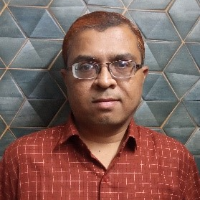
Surat Municipal Institute of Medical Education and Research, India
Abstract:
Intracranial
neoplasms and plasma cell malignancies often present with nonspecific symptoms,
leading to delayed diagnosis and unexpected clinical outcomes. This
presentation explores two distinct cases—one involving an incidental meningioma
discovered during autopsy in a patient with chronic headaches, and another of
extramedullary multiple myeloma (EMM) with central nervous system (CNS)
involvement, manifesting as a sudden pathological fracture followed by fatal
progression.
The
first case involves a 25-year-old female who presented with prolonged fever due
to Plasmodium vivax malaria and later succumbed to septicemia and pulmonary
edema. Autopsy revealed a previously undiagnosed right temporal meningioma,
raising concerns about the overlooked role of intracranial tumors in chronic
headaches. The absence of neuroimaging in symptomatic individuals underscores
the need for proactive neurological assessments in patients with persistent
headaches.
The
second case details a 35-year-old male with HIV, presenting with progressive
neurological deficits and pathological fractures. Imaging detected multiple
osteolytic cranial lesions, suggestive of neoplastic infiltration. Despite
aggressive supportive care, the patient deteriorated rapidly. Autopsy findings
confirmed CNS EMM, characterized by extensive lytic skull lesions and
dura-adherent soft tissue masses causing significant brain compression. The
case emphasizes the diagnostic challenges and critical need for early detection
strategies in multiple myeloma patients at risk for extramedullary progression.
Both
cases highlight the practical implications of incidental neoplasms and
hematological malignancies, emphasizing the role of autopsy in uncovering
silent pathologies and guiding clinical decision-making. This analysis
advocates for enhanced screening protocols for headache-associated tumors and
early orthopedic and neurological interventions in plasma cell malignancies to
improve patient outcomes.
Biography:
Dr. Jayeshkumar Kanani has over 14 years of experience including 8 years of experience in the field of forensic medicine and Toxicology. Appointed in 2016 as an autopsy medical officer, he has conducted over 4,000 autopsies, providing invaluable medico-legal expertise in death investigations. His expertise extends to histopathological studies, scientific writing, court testimonies, and mentoring students in forensic medicine.
Dr. Kanani has published eight peer-reviewed papers in international journals such as Elsevier, BMC, and SpringerNature, with seven as the first author. He has demonstrated exceptional skill in managing the publication process, and successfully publishing articles with tight deadlines.
His research interests include general medicine, forensic medicine, Toxicology, Surgery, Cardiology, Pathology, Oncology, and Neurology. He is passionate about contributing to the academic and professional community and welcomes opportunities to collaborate on research and editorial endeavours.
